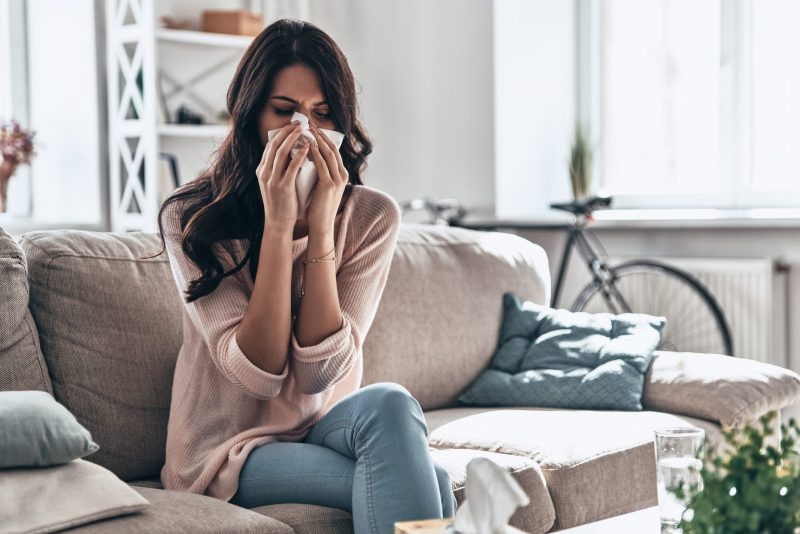If you suffer from allergies, it can be difficult to find relief. They seemingly affect many people year-round. From pollen to dust to molds, it’s tough to get away from allergens and alleviate allergy symptoms.
However, there are steps you can take to improve the situation. Here are why allergens often affect us, and the 3 best natural ways to alleviate allergy symptoms.
Allergies: Numbers and Methods
Allergies are common. In fact, according to the CDC, more than 50 million Americans now suffer from allergies each year (1).
At their core, allergic reactions are inflammatory responses and may occur most often in those who have greater inflammatory reactions in general.
In fact, studies show that those with seasonal allergic reactions and asthmatic allergies have higher underlying inflammation even when they are not showing symptoms (2). These results have led experts to believe that reducing the underlying inflammation may improve asthmatic and allergic conditions.
Here are 3 strategies to help you alleviate allergic reactions!
3 Natural Strategies to Alleviate Allergy Symptoms
1. Support Your Immune System with the Right Nutrients
First and foremost, you can support your body with the right nutrients when fighting seasonal allergy symptoms. Four to consider are:
Omega-3 Fatty Acids
Start by consuming nutrients that reduce inflammatory reactions. Omega-3s from fish oil are the best source available. You can take a potent omega-3 supplement daily or consume fatty fish regularly. Of course, if you are “aspirin-sensitive” or on blood thinners, always talk to your doctor before starting or increasing fish oil.
Probiotics
While it may seem odd that your gut has anything to do with sneezing and post-nasal drip, probiotics have been shown to help those with seasonal allergies.
In fact, one study of 173 people who suffer from seasonal allergies found that taking a daily probiotic with lactobacillus strains significantly improved their “quality of life” scores from baseline to peak pollen compared to a placebo group (3). It is hypothesized that probiotics help to increase the percentage of regulatory T cells (Tregs) thereby improving allergen tolerance.
Zinc, Vitamin C, and Vitamin D and More
There are also vitamins and minerals that bolster immune response. Dr. Colbert’s Enhanced Multivitamin and Organic Divine® Health Green Supremefood® contain balanced amounts of important nutrients for the immune system and immune response. These include organic greens, probiotics, zinc, vitamin C, vitamin D, and more.
Apple Cider Vinegar
While not exactly a “nutrient,” apple cider vinegar works against allergies in 2 ways:
First, scientists have found that the bacteria in raw vinegar can actually improve immune factors and protect from an allergic reaction (4).
Next, apple cider vinegar is a natural decongestant, and it causes your sinuses to drain when you drink it. While the relief is temporary, it is effective and reduces the risk of clogged sinuses becoming infected.
How should you take it? ALWAYS dilute apple cider vinegar. Taken straight, it can damage your esophagus. Mix 1 Tbsp. apple cider vinegar, 4 oz. water, 1/2 tsp ginger, ½ tsp cinnamon, and stevia to taste. Take 2-3 times per day during allergy season.
2. Optimize Your Diet to Reduce Inflammatory Responses
In addition to consuming anti-inflammatory and immune-supporting nutrients, it’s vital to vastly reduce pro-inflammatory foods and fats in your diet.
How?
Ultra-Processed Foods
First, identify and remove ultra-processed foods.
Ultra-processed foods are the commercial, processed foods that contain a lot of processed fats and sugars. These foods and the carbohydrates and fats in them promote inflammation, weight gain, abnormal blood glucose, elevated blood pressure, and more in the body. If you want a healthy body and immune system, start by reducing any ultra-processed foods in your diet, if needed.
Processed Omega-6 Fatty Acids
Second, remove as many potent, processed sources of omega-6 fats as possible. Processed omega-6s act as an antagonist to omega-3s in the body, and work to increase inflammatory factors and reactions.
How can you remove them? The best way is to look at every single item you buy with an ingredient label, and avoid all products with soybean oil. Then, take it a step further and avoid all those with high omega-6s. The full list and steps can be found here.
3. Clean up Your Environment to Reduce Allergens
Whether you’re inside or out, allergens come from your environment. Here are a few steps you can take to reduce your allergen contact while still enjoying the health benefits of the great outdoors.
Leave Your Shoes Outside
Shoes have a way of trapping pollen on them and then depositing it all over your floor surfaces if worn inside.
Instead, remove them at the door and leave them outside.
Keep Your Floors and Counters as Clean as Possible
Dust mites cause many allergy symptoms.
You can decrease dust mites in your home. Dust regularly, vacuum, and use a HEPA filter. Wash floors and surfaces regularly. These tasks can help reduce dust mites and thereby seasonal allergies and symptoms.
Keep Windows and Doors Closed
Especially if you live in an area with high pollen counts, keep windows and doors closed.
Pollen blows around most in the Spring, and typically in the early hours of the day. Keep windows and doors closed to avoid pollens blowing inside.
Instead, use an air conditioner if you feel too warm. Make sure to change the old filters as they will most likely be full of dust, pollen, and mold.
Installing an air purifier with a HEPA filter will also help to remove allergens from the interiors.
Take Showers Often and Change Clothes After Being Outside
Clothes and hair are pollen magnets, so take them off and rinse as soon as possible!
Instead of dragging the pollen inside and sitting it in, shower and change.
Remove Pollen Before You Lie Down
Consider showering before bed, changing pillowcases daily, and sheets regularly. If you go to bed with pollen in your hair, it can stay on your pillowcase for days. Then, you’re essentially sleeping in pollen!
Keep these soft surfaces as clear of pollen as possible to get a good night sleep and wake up feeling better rather than worse.
Keep Your Nose Clean
The environment of your nose is also an important consideration. If you can get the allergens out that are trapped inside your nose, you can alleviate allergies.
To do so, try all-natural nasal sprays and/or a neti-pot flush.
At most stores and pharmacies, you can find nasal sprays with simple ingredients like baking soda, salt, and purified water. These sprays flush out your nasal passages. When used a few times per day they can ease allergy symptoms, especially if you begin using it proactively before strong symptoms begin.
Bottom Line
Allergies are a reality for many, many adults. However, you can use our strategies to gain relief immediately. Alleviate allergy symptoms with healthy nutrients, a “clean” anti-inflammatory diet, and an improved personal environment.
Then, let us know how these tips helped you!
















